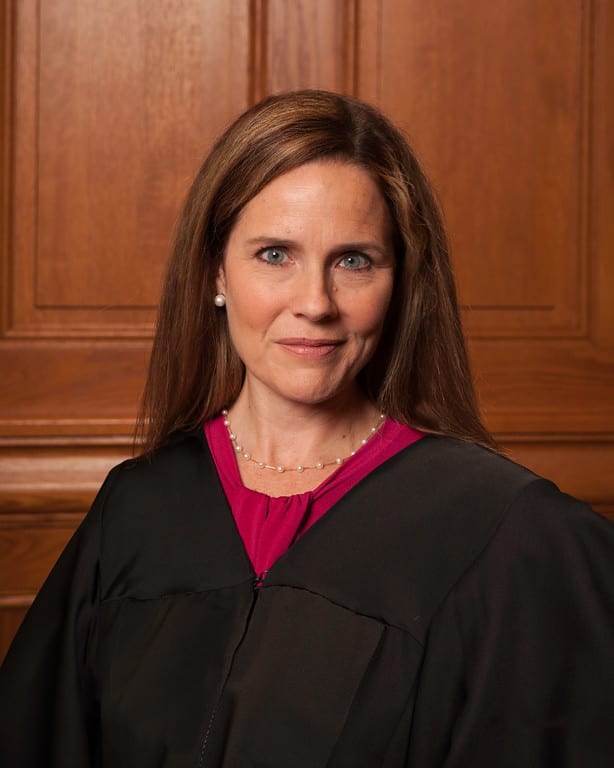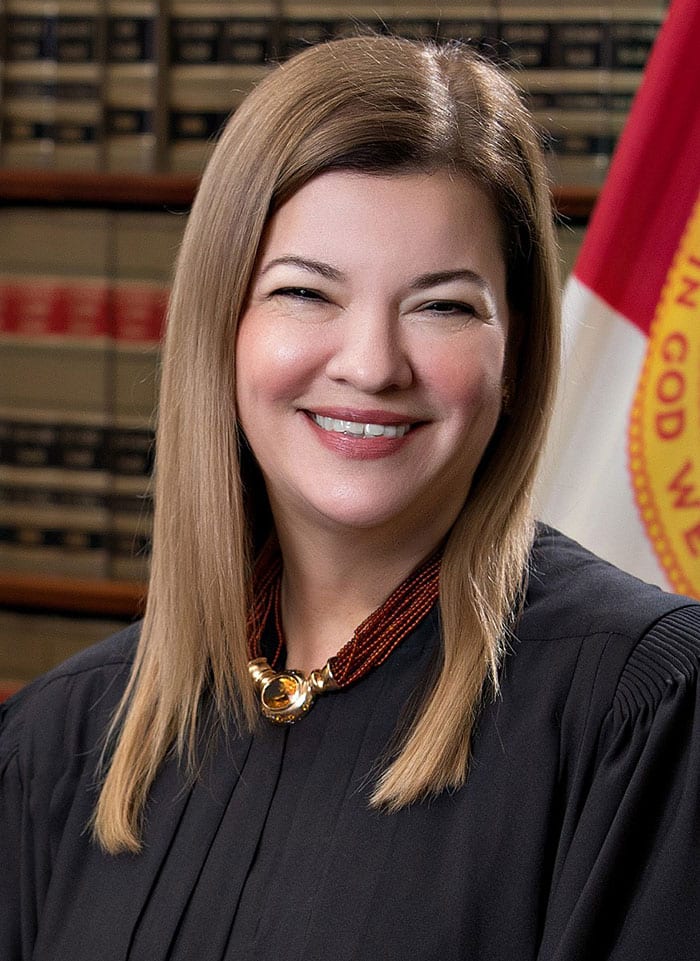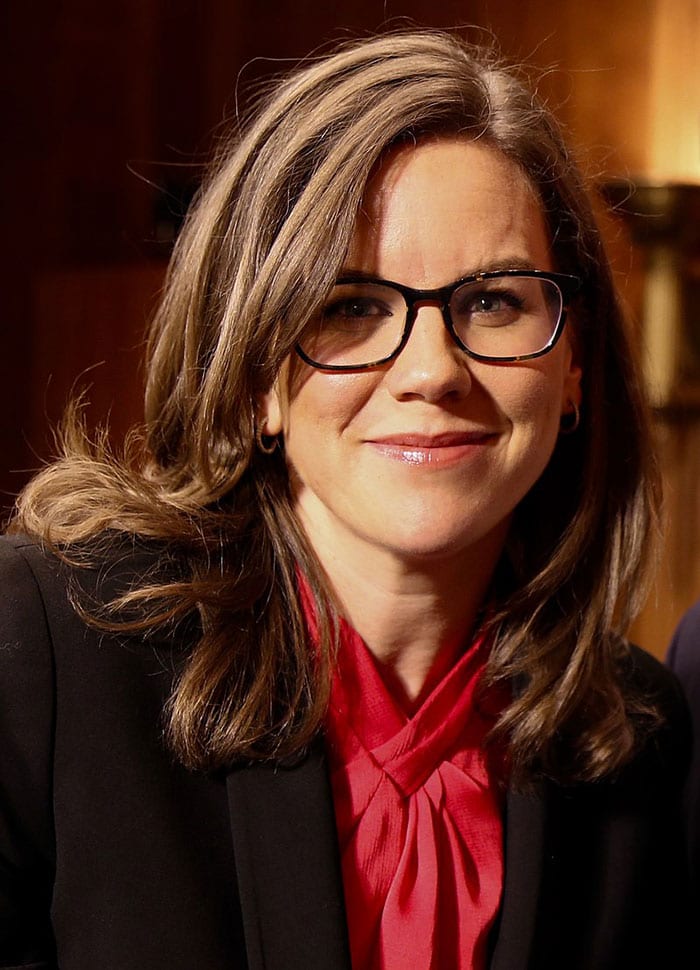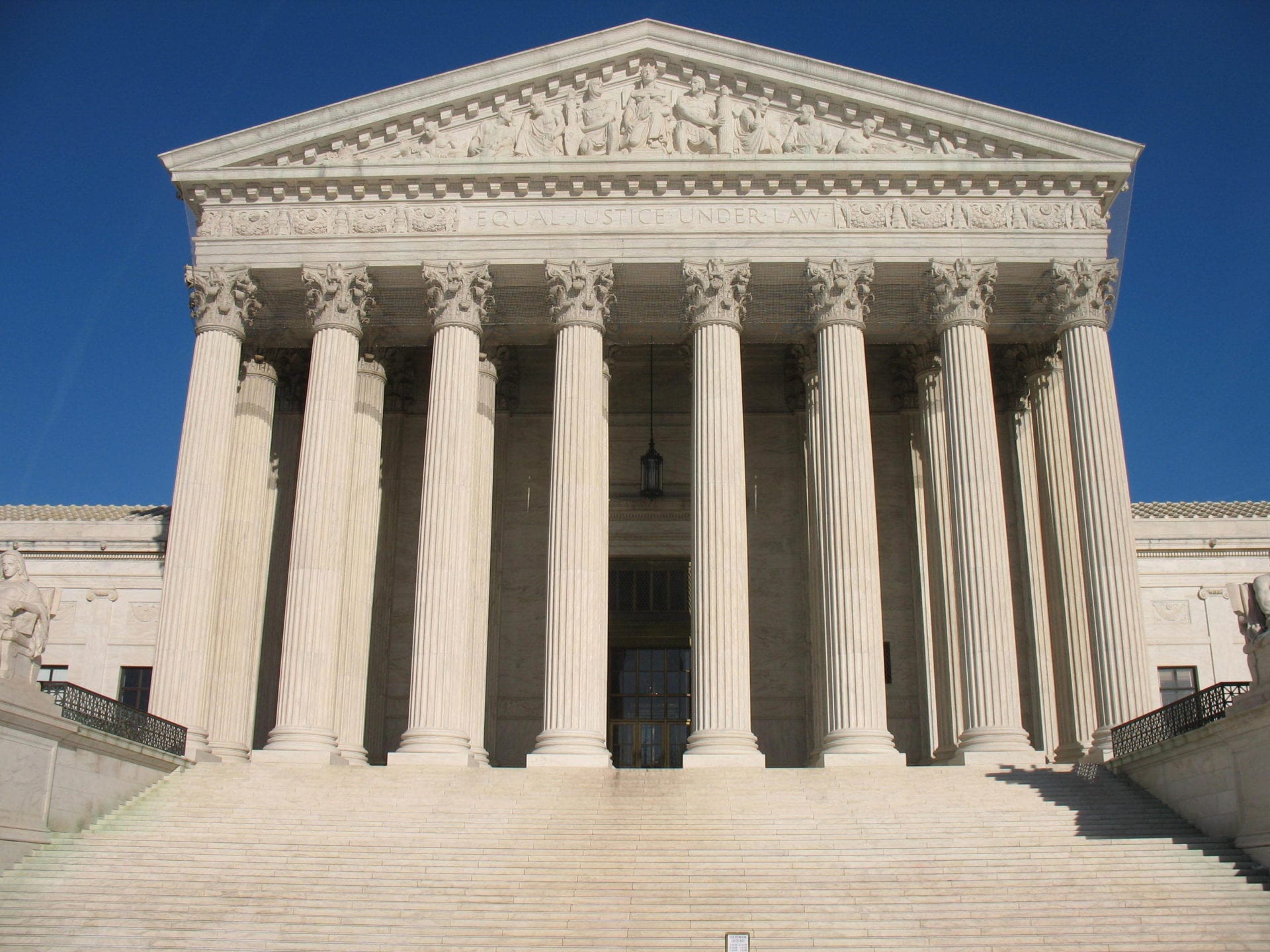In 2015, while speaking at Georgetown University in Washington D.C., the late Justice Ruth Bader Ginsburg said, “People ask me sometimes, when — when do you think it will be enough? When will there be enough women on the court? And my answer is when there are nine.” Now, just one week after her death, President Donald Trump has nominated another woman, Judge Amy Coney Barrett, to fill the vacant seat RBG left behind on the Supreme Court.
In her acceptance speech, which you can view below, Judge Barrett acknowledged the late Justice Ginsburg’s life and legacy in the American judicial system: “[she] began her career at a time when women were not welcome in the legal profession. But she not only broke glass ceilings, she smashed them. For that, she has won the admiration of women across the country and indeed, all over the world. [Ruth Bader Ginsburg] was a woman of enormous talent and consequence, and her life of public service serves as an example to us all.”
Read more about Judge Barrett and the other “[women] of enormous talent” who were on the shortlist to be nominated as the next female Supreme Court Justice.
Amy Coney Barrett of Indiana, U.S. Court of Appeals for the Seventh Circuit
Amy Coney Barrett, circuit judge on the U.S. Court of Appeals for the Seventh Circuit, has experience making history as the first (and still the only to date) woman to hold an Indiana seat on the Seventh Circuit. Now, Barrett is widely considered to be the frontrunner in the race for the nomination after she appeared at the White House two days in a row earlier this week.
Barrett is also a professor of law at Notre Dame Law School, where she earned her law degree; as a student, she served as executive editor of the Notre Dame Law Review and graduated first in her class in 1997. Barrett began teaching at her alma mater in 2002 and has since received the “Distinguished Professor of the Year” award three separate times. While serving as a sitting judge, she continues to teach seminars and has even visited The George Washington University Law School as an associate professor.

Amy Coney Barrett on August 24, 2018. Photo courtesy of Rachel Malehorn, smugmug.com.
The New Orleans native has experience with the Supreme Court as she clerked with Justice Antonin Scalia in the late 90’s before practicing law at Miller, Cassidy, Larroca & Lewin in Washington, D.C. On top of all of her other accomplishments, Barrett is a committed mother to seven children, two of whom she and her husband, Jesse, adopted from Haiti.
Allison Jones Rushing, U.S. Court of Appeals for the 4th Circuit
At just 38 years old, Circuit Judge Allison Jones Rushing would be the youngest Supreme Court justice in United States history if she is nominated and confirmed. Rushing was nominated for the U.S. Court of Appeals for the Fourth Circuit and was confirmed in 2019, after she worked as a partner at Williams & Connolly in Washington, D.C.
She also spent time as a clerk for the Department of Justice in 2007 and for Associate Justice Clarence Thomas of the Supreme Court in 2010. A devout Christian, Rushing has worked extensively with the Alliance Defending Freedom, a conservative Christian nonprofit organization. She interned with them in law school and continues to write briefs for and speak at the organization’s events.
Born in North Carolina, Rushing went to Wake Forest University for her undergraduate degree before earning her Juris Doctor from Duke University School of Law. At Duke, Rushing served as the executive editor of the Duke Law Journal. She is now married to Blake Rushing and together they have one child.
Barbara Lagoa, U.S. Court of Appeals for the 11th Circuit
Circuit Judge Barbara Lagoa is another woman on the short list who has made history — she was the first Hispanic woman to be made a Justice of the Supreme Court of Florida. Lagoa was appointed in 2019 after serving as the Chief Judge of the Third District Court of Appeal.
A Cuban-American, Lagoa is bilingual and earned a Bachelor of Arts from Florida International University before moving on to get her law degree from Columbia Law School, where she was an associate editor of the Columbia Law Review.

Florida Supreme Court Justice Barbara Lagoa in 2019. Photo courtesy of the Supreme Court of Florida.
In the early 2000’s, Lagoa worked as a pro-bono lawyer representing the family of the famed Elián González in her hometown of Miami, Florida. In 2003, she transitioned to become an Assistant United States Attorney for the Southern District of Florida. Lagoa is married to fellow lawyer Paul Huck Jr. (son of United States District Judge Paul Huck) and has three daughters.
Kate Todd, deputy White House counsel
Kate Comerford Todd, a deputy White House counsel, stands out in the shortlist for nomination as the only lawyer who has never served as a judge. She also is unique in that her academic path mirrors that of the person she would be replacing; both Todd and Ginsburg studied government at Cornell University for undergraduate before earning their law degrees from Harvard Law School.
While at Harvard, Todd was the executive editor of the Harvard Law Review. The former senior vice president and chief counsel for the U.S. Chamber Litigation Center, the litigation arm of the U.S. Chamber of Commerce, Todd has extensive experience with the law.
She clerked for Justice Clarence Thomas (both on the Supreme Court and on the U.S. Court of Appeals for the Fourth Circuit) and was a partner at Wiley, Rein & Fielding in Washington D.C. In addition, Todd employs her knowledge of the law of federal courts teaching at The George Washington University Law School. She is a mother to four children and lives in Virginia with them and her husband, Gordon.
Allison Eid of Colorado, U.S. Court of Appeals for the Tenth Circuit
Allison Eid, a former Colorado Supreme Court justice, currently sits on the U.S. Court of Appeals for the Tenth Circuit as a circuit judge. Eid has had an extensive and diverse career with the law; after completing her undergraduate degree, she was a speechwriter for the Reagan administration’s Secretary of Education, and after law school, she served as a clerk for Supreme Court Justice Clarence Thomas before becoming Solicitor General of Colorado and eventually moving on to sit on the state’s Supreme Court.
While at Stanford University for undergrad, Eid was working as a student food service worker and met her husband, Troy, as he was standing in the cafeteria line. The two are quite the power couple — just a few months after Eid joined the Colorado Supreme Court, Troy was appointed as the United States Attorney for the District of Colorado, making history as the first Egyptian-American U.S. Attorney. The two live in Colorado with their two kids.
Bridget Bade, U.S. Court of Appeals for the 9th Circuit
Bridget Shelton Bade, United States Circuit Judge of the U.S. Court of Appeals for the Ninth Circuit, kick-started her law career as a clerk for Judge Edith Jones of the United States Court of Appeals for the Fifth Circuit before practicing as a trial attorney for the United States Department of Justice Civil Division. She then spent some time in private practice as a shareholder and special counsel before starting as an Assistant United States Attorney for the District of Arizona.
President Donald Trump has added Phoenix native Bridget Bade to his short list of potential Supreme Court justices. She has served as a judge on the 9th U.S. Circuit Court of Appeals only since last year. Read more from @KatieFusillo. https://t.co/oel2BalK6e
— Cronkite News (@cronkitenews) September 20, 2020
The Phoenix native earned her undergraduate degree from Arizona State University and her law degree from their law school, the Sandra Day O’Connor College of Law, named for the first woman to serve as an associate justice of the Supreme Court.
Britt Grant of Georgia, Supreme Court of Georgia
Former Georgia Supreme Court Justice Britt Grant, who now is a circuit judge for the United States Court of Appeals for the Eleventh Circuit, has dedicated herself to public service for most of her career. Prior to sitting on the Supreme Court of Georgia, she served as Solicitor General for the State of Georgia and worked in the Office of the Georgia Attorney General.
She also worked in the second Bush administration and at one point clerked for then-Judge Kavanaugh of the United States Court of Appeals for the District of Columbia Circuit. Additionally, she has three children with Justin Grant, who worked for the Central Intelligence Agency.

Georgia Supreme Court Justice Britt Grant May 23, 2018. Photo courtesy of the Office of U.S. Senator David Perdue.
Grant attended Wake Forest University for undergraduate, then received her law degree from Stanford Law School. At Stanford, she was president of the school’s Federalist Society chapter.
Diane Sykes of Wisconsin, U.S. Court of Appeals for the Seventh Circuit
Diane Sykes, Chief United States Circuit Judge of the United States Court of Appeals for the Seventh Circuit, is a formidable woman. Born in Milwaukee, Wisconsin, Sykes is both a loving mother to two sons and an honored judge with a fondness for the Midwest.
In 1980, she graduated with a bachelor’s degree in journalism from Northwestern University, after which she went on to work for The Milwaukee Journal, Wisconsin’s preeminent newspaper. In 1984, Sykes set her remarkable career in motion after receiving her Juris Doctorate from Marquette University. She worked as a judicial clerk for a year post-graduation and then went on to become a litigator at Whyte & Hirschboeck for seven years.
Judge Diane S. Sykes, of the U.S. Court of Appeals for the Seventh Circuit, delivers the Peck Lecture in Hays Hall. She will receive the 45th Senior Peck Medal tonight. pic.twitter.com/lmudAmeVtT
— Wabash College (@WabashCollege) April 16, 2018
In 1992, Sykes was elected as a judge to the Milwaukee County Circuit Court and later, in 1999, was appointed to the Wisconsin Supreme Court. In 2003, she was nominated and confirmed to the United States Court of Appeals for the Seventh Circuit where, just several months ago in July of 2020, she was named Chief Judge.
Joan Larsen of Michigan, U.S. Court of Appeals for the Sixth Circuit
Joan Larsen is a United States circuit judge for the U.S. Court of Appeals for the Sixth Circuit who previously sat on the Michigan Supreme Court before being nominated for the circuit court in 2017. The Iowa native graduated from the University of Northern Iowa before going on to earn her Juris Doctorate from Northwestern University Pritzker School of Law where she was articles editor for the Northwestern University Law Review.
Larsen, who was also on Trump’s list of potential Supreme Court nominees in 2016, has experience teaching law and practicing both in the private and public sector. She was a professor at University of Michigan School of Law, as well as a visiting lecturer at Pritzker.
Additionally, Larsen clerked for Justice Scalia before moving to a private firm in Washington, D.C. During George W. Bush’s administration, she served as the Deputy Assistant Attorney General in the Department of Justice Office of Legal Counsel
Margaret Ryan of Virginia, U.S. Court of Appeals for the Armed Forces
Margaret Ryan is not only an honored judge on the United States Court of Appeals for the Armed Forces, but a revered former Marine who served active duty for eight collective years. She acted as a platoon commander during the Gulf War and later went on to serve as a Trial Counsel and Chief Trial Counsel in Okinawa and Quantico respectively.
In addition to these impressive accomplishments, Ryan acted as Aide de Camp to the Commandant of the Marine Corps, General Charles Krulak. In 2000, Ryan clerked for Judge J. Michael Luttig on the United States Court of Appeals for the Fourth Circuit; a year later, she began clerking for United States Supreme Court Justice Clarence Thomas.
After her clerkship, Ryan worked for several private practices including Wiley Rein LLP, Bartlit Beck Herman Palenchar & Scott, and Cooper, Carvin & Rosenthal. In 2006, she was nominated and confirmed to the United States Court of Appeals for the Armed Forces where she remained until July, 2020. Ryan now works as an adjunct professor at the University of Notre Dame where she teaches Evidence, Military Law, and Constitutional Issues in the Military Justice System.
Martha Pacold, U.S. District Court for the Northern District of Illinois
Martha Pacold, United States district judge of the U.S. District Court for the Northern District of Illinois, is an experienced and intelligent woman. She served as a deputy general counsel of the United States Department of the Treasury before she was nominated for the District Court in 2018.
Earlier in her career, Pacold clerked for Justice Clarence Thomas on the Supreme Court and served as a partner at Bartlit Beck Herman Palenchar & Scott, LLP in Chicago.On top of her work as a lawyer, Pacold was a lecturer at the University of Chicago Law School, which is where she earned her Juris Doctorate.
At Chicago, she was inducted into the Order of the Coif and served as Editor-in-Chief of the University of Chicago Law Review. Prior to attending law school, Pacold got her Bachelor’s degree from Indiana University on a full-tuition merit scholarship. Originally from Richmond, Virginia, she now lives in Illinois.
Sarah Pitlyk, U.S. District Court for the Eastern District of Missouri
United States District Judge Sarah Pitlyk is not only one of the most educated women on this list — she has a Bachelor’s degree, two Master’s degrees and a Juris Doctorate — but she is also a devoted mother and judge. A mother to four children, she lives in St. Louis and has served on the District Court for the Eastern District of Missouri since 2019.
U.S. District Judge Sarah E. Pitlyk was sworn in by Chief Judge Rodney W. Sippel in a private ceremony on Fri Dec 6. Judge Pitlyk fills the vacancy created when Senior District Judge Catherine D. Perry took senior status at the end of 2018. https://t.co/E5qnQIcSTJ pic.twitter.com/sQIvGqCoGx
— US District Court MOED (@USCourtsMOED) December 6, 2019
Right after graduating from Yale Law School, Pitlyk was a clerk for Brett Kavanaugh when he was a judge for the United States Court of Appeals for the District of Columbia Circuit. She then worked at a civil litigation firm in St. Louis and at Covington & Burling in Washington, D.C. before landing at the Thomas More Society in Chicago.
Editor’s Note:
In writing this article, my decision to include information about the potential nominees’ family and personal life was made in an attempt to give praise to these women for their ability to balance their career with motherhood, among other things. Yet, throughout my research, it was hard to not notice the abundance of information available about these women’s families and I would like to ask our readers: Do you think we would be asking the same of the male nominees? Would family life even enter the conversation?
by Claire Kuwana

